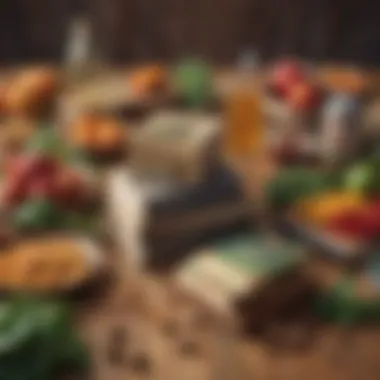Exploring Michael Pollan's Impact on Food and Nature


Intro
Michael Pollan stands out as a prominent voice in contemporary literature, particularly in the realms of food studies, environmentalism, and cultural reflection. His works are not mere books; they are an invitation to rethink our relationship with food and nature. With a knack for weaving personal narrative and rigorous research, Pollan has captured the interest of both casual readers and scholars alike. His insightful storytelling often urges us to take a step back, to question how what we consume shapes not only our physical well-being but also our ethical and environmental landscapes.
Pollan's writing navigates various themes — from the simple pleasures of growing food to the complexities surrounding industrial agriculture. His ability to connect the dots between individual choices and broader societal implications bridges the gap between personal action and collective responsibility. As we embark on this exploration of Pollan's work, it’s essential to understand the salient points that not only define his narratives but also resonate deeply in the dialogue surrounding food and sustainability today.
"Eat food, not much, mostly plants." This straightforward mantra encapsulates Pollan's approach and serves as a guiding principle throughout his writing, offering a succinct reflection of his philosophy.
In the following sections, we will distill key themes from Pollan's books, delve into various insights pulled from his extensive oeuvre, and consider actionable takeaways that readers can integrate into their daily lives. This journey promises not only to enlighten the mind but also to provoke thoughtful discussions about the way we engage with food and the natural world.
Preamble to Michael Pollan
Michael Pollan stands as a significant figure in contemporary literature, particularly in the realm of food and nature—a domain that intertwines our dietary practices with environmental concerns. His writings are not merely a feast for the intellect; they challenge readers to rethink their relationship with what they eat and how it affects the world around them. As we break down Pollan's contributions, we uncover the layers of understanding that he brings to the table, so to speak.
Background and Early Life
Michael Pollan was born in 1955 in Long Island, New York, to a family that had a strong grounding in literature and education. His upbringing was marked by a curious mind, traversing various interests, from gardening to general natural history. Growing up near the vibrancy of New York City likely shaped his perceptive lens through which he views both urban and agricultural landscapes.
Pollan's early life provided fertile ground for his future explorations. He earned his Bachelor's degree from Harvard and later received a Master's from Columbia University in English. The blend of his literary pursuits with an innate curiosity about the natural world foreshadowed the thematic threads that would surface throughout his oeuvre. His formative experiences resonate strongly in his work, drawing upon his childhood encounters with nature and food.
Career Overview
Pollan's career is a tapestry woven from a variety of threads—journalism, authorship, and advocacy. His journey began in the world of magazine writing, contributing to significant publications such as The New York Times Magazine and Harper's. However, it’s his books that perhaps offer the most insight into his philosophical musings.
Each of Pollan's works invites readers to dive into complex narratives that unravel humanity’s role within our ecosystems. Notably, he gained widespread acclaim with The Omnivore’s Dilemma, which examines the ethical implications of our food choices.
In addition to his writings, Pollan has taken on teaching roles, notably at the University of California, Berkeley. Here, he can share his insights directly with students, igniting conversations about food policy, sustainability, and environmentalism. His ability to bridge the gap between academic discourse and popular writing makes his work relatable to a broad audience, effectively bringing intellectual rigor to a larger public conversation.
Pollan’s career reflects a commitment not only to food advocacy but also to a deeper understanding of nature and sustainability, positioning him as a thought leader in the ongoing dialogue about how we relate to our planet and its resources.
The Influence of Nature on Pollan's Work
Michael Pollan's writings possess a distinctive thread weaving through all of his explorations: the profound connection to nature. This influence feeds into his work not only as a thematic backbone but also as a lens through which he examines broader cultural, agricultural, and philosophical concerns. By delving deep into the nuances of how natural elements interplay with human actions, Pollan encourages readers to rethink their relationship with the environment and the systems that govern our food production.
Connection to Agriculture and the Environment
Pollan's connection to agriculture isn't merely academic; it's deeply personal. Growing up in suburban New York, he witnessed the shifting landscapes driven by urban sprawl. His appreciation for farming and biodiversity is evident in his prose, where he reflects on the complexities of agroecology. In The Omnivore's Dilemma, he meticulously traces the journey of four meals, embodying the stark contrasts between industrial farming and sustainable practices.
The juxtaposition reveals the detrimental effects of factory farming on soil health and ecosystems. Pollan doesn't shy away from detailing the harsh realities, urging readers to confront the true costs of their food choices. The narrative takes on an almost poetic quality when Pollan describes the intimacy between farmer and land. He illustrates the beautiful resilience of nature when treated with respect, fueling advocacy for practices like crop rotation and permaculture. This deep interplay between agriculture and environmental sustainability is a call to arms for individuals to engage more thoughtfully with their consumption habits.
- Local Farms: Pollan often champions small-scale local farms, highlighting their role in maintaining biodiversity.
- Soil Health: He discusses the essential role of healthy soil in the larger ecological web, showcasing how it secures food production for future generations.
- Environmental Impact: Pollan’s work serves as an exhaustive critique of monocropping and pesticide usage, providing insight into how they disrupt natural ecosystems.
Pollan's commitment extends beyond mere observation; it invites readers to participate in a larger conversation about sustainability and responsibility in our food systems. The anecdotal and journalistic approach he takes breaks down complex ideas into manageable pieces, making his work not only informative but also personally relevant.
Philosophical Underpinnings
At the heart of Pollan's exploration lies a philosophical inquiry that wrestles with the implications of how we engage with the natural world. He probes questions about desire, ethics, and our increasingly commodified approach to life. In The Botany of Desire, for example, Pollan asserts that plants have evolved to fulfill human desires—offering a reciprocal relationship that sheds light on our shared existence.
This idea challenges the reader to reconsider the anthropocentric worldview that often characterizes discussions of nature. Pollan suggests that the lines between humans and the natural world are more blurred than we typically acknowledge, urging us to explore symbiotic relationships instead of viewing ourselves as separate or superior. In this sense, his philosophy intertwines with environmentalism, advocating for stewardship over dominion.
- Interconnection: Pollan emphasizes how every action, such as planting a seed or choosing what to purchase, creates ripples in ecological balances.
- Mindfulness in Consumption: His reflections push for mindful choices that honor both the environment and the human experience.
- Personal Responsibility: The philosophical discourse in Pollan’s work instills a sense of responsibility that resonates with readers, promoting agency in food choices.
In essence, the influence of nature in Pollan's oeuvre turns readers into active participants in the narrative about food and environmental health. This compelling intersection of ecological awareness and philosophical depth encourages a broader understanding of our collective role shaping the world around us.
A Culinary Perspective: 'The Omnivore's Dilemma'
Michael Pollan's 'The Omnivore's Dilemma' stands not just as a book, but as a critical lens through which we can examine the intricate relationship between what we eat and the system that produces our food. Written in 2006, this seminal work invites readers to grapple with the complexities of food choices in a modern world filled with conflicting messages about health, sustainability, and ethics. The book embodies Pollan's deep concern for the food system, revealing how it blurs into broader sociopolitical realms. In essence, it's a wake-up call, endowing readers with the knowledge to navigate a food landscape often fraught with confusion and misinformation.
Overview of the Book
Pollan presents the concept of the "omnivore's dilemma"—the challenge faced by humans in deciding what to eat among a plethora of choices available. He systematically follows the footsteps of our food from its origins in the soil through to the table, highlighting three primary food sources: industrial, organic, and foraged. What makes the narrative particularly engaging is not just Pollan’s investigative flair, but his ability to meld personal anecdotes with thorough research. He embarks on a journey to understand where our food really comes from, challenging the reader to think more critically about their food sources. The reader is enlisted in an exploration that feels both personal and universal, with Pollan documenting every bite, every choice.
Key Themes and Arguments
Several key themes emerge as Pollan delves into the various food systems:
- Food Production: The stark contrast between industrial farming and sustainable practices is a recurring motif. Pollan argues that industrial agriculture is predicated on the quest for efficiency at the expense of health and quality.
- Ethics of Eating: Pollan encourages an ethical perspective on food consumption. He explores moral dilemmas involved in our choices, asking questions about the consequences for soil, water, and living beings.
- Cultural Connection: The narrative unveils how food deeply intertwines with culture and identity. Pollan illustrates how our eating habits reflect societal values and must be examined against the backdrop of our wider environment.
"Eat food, not much, mostly plants"—a succinct phrase that encapsulates Pollan's stance.


Impact on Food Culture
Pollan’s 'The Omnivore's Dilemma' has ignited significant discourse surrounding food ethics and sustainability, inspiring a movement toward more transparent food sourcing practices. Because of the book, many people have become more discerning consumers. The mix of practical advice with philosophical questioning resonates with a wide audience, from food enthusiasts to casual eaters. The discussions sparked by Pollan's arguments prompted the mainstream media to take a closer look at the implications of our food choices, leading to a greater demand for accountability in food production.
- Rise of Localism: One notable impact has been the increase in popularity of local farmers’ markets and community-supported agriculture (CSA) programs. Consumers are more eager to understand the source of their food—who grew it, how it was processed.
- Culinary Education: The book has encouraged educational initiatives aimed at informing people about nutrition and sustainable practices. Schools are now integrating food studies into curricula—teaching the importance of not just healthy eating, but also cultivating connections to one’s food.
Challenging Industrial Food Production: 'In Defense of Food'
Michael Pollan's book "In Defense of Food" stands as a pivotal work in his exploration of the modern food landscape. It addresses the dichotomy between industrial food production and traditional eating habits, emphasizing the necessity for a shift in our understanding of food as more than just sustenance—it's a cultural and ecological act. By advocating for a return to whole foods and natural practices, Pollan challenges readers to reconsider their dietary choices and the implications those choices have on health and the environment.
This discussion is vital within the article as it not only reflects Pollan's critique of the food industry—dyed in the wool with complex processing and profit-driven motives—but also opens up a broader narrative about health and well-being in contemporary society.
Synopsis of Pollan's Arguments
At the heart of Pollan's arguments is a simple yet powerful mantra: "Eat food, not much, mostly plants." He asserts that the modern industrial food production model has led to the production of highly processed foods that are often unhealthy and disconnected from their origins. A few essential points derived from his work include:
- The Fallacy of Nutritionism: Pollan labels nutritionism as a misguided approach that treats food as merely a source of nutrients rather than a holistic experience.
- Industrialization of Food: He highlights how food industries prioritize convenience over quality, creating a system rooted in mass production that often disregards ethical farming practices.
- Cultural Heritage of Eating: Pollan invokes the importance of customs and shared meals that have been overshadowed by the fast-paced, consumer-oriented food environment.
Through these points, Pollan scrutinizes the negative ramifications of a diet based predominantly on processed foods, which often contribute to health issues like obesity and diabetes.
Cultural Commentary on Eating Practices
Pollan's commentary transcends mere dietary preferences. He integrates a nuanced critique of eating practices into his discussion, shedding light on how modern lifestyles influence our food choices.
One significant aspect of his commentary is the disconnection consumers face from the sources of their food. People tend to frequent supermarkets without understanding the journeys that food takes.
- The Importance of connection: Pollan promotes awareness of food origins, emphasizing the benefits of supporting local farmers and engaging with nature.
- Mindful Eating: His suggestion to slow down and savor meals stands as a rebellion against today's fast-paced lifestyle. It invites readers to reflect on their plates and appreciate the effort behind their nourishment.
- Social Context: Eating is not just a biological necessity; it’s a social event. Pollan underscores the importance of sharing meals as a way of fostering community ties and nurturing relationships.
"The act of eating is fundamentally about connection—to the food, to nature, and to one another."
In summary, Pollan’s "In Defense of Food" intricately weaves critiques of industrial processes with a call for cultural mindfulness. This section navigates through the complicated waters of modern diets, advocating for a return to practices that celebrate food as a means of connection and nourishment rather than mere consumption.
Exploring the Psyche: 'How to Change Your Mind'
Michael Pollan's 'How to Change Your Mind' ushers readers into the multifaceted universe of psychedelics. This topic resonates deeply not only within the realm of food and nature but also within the social conversation surrounding mental health and well-being. Through this work, Pollan probes into ancient practices and modern science, establishing a compelling dialogue about the potential therapeutic benefits of psychedelics.
Prelude to Psychedelics
In recent years, there has been a noticeable shift in how society perceives psychedelics. Once relegated to the fringes of conversation as taboo or solely associated with the counterculture of the 60s, psychedelics are now being recognized for their potential to facilitate profound psychological change. Pollan does not shy away from these complexities; instead, he embraces them. He reflects on the history of these substances in our culture and invites readers to consider their role not just as recreational tools but as catalysts for personal transformation.
Pollan's exploration of psychedelics is rooted in research and anecdotal evidence, making it both informative and personal. He articulates the journey of individuals who have undergone significant shifts in perspective. As he gathers insights from scientists and participants alike, he illustrates how psychedelics can awaken new levels of consciousness and emotional understanding, leading to increased empathy and a deepened appreciation for the interconnectedness of life.
Personal Accounts and Scientific Insights
In this section, the interplay between empirical evidence and human experience comes to the forefront. Pollan shares stories from those who have traversed the psychedelic landscape, weaving together narratives that depict not just triumph but challenges faced along the way. Many individuals report experiences that transcend the ordinary, portraying feelings of unity with nature and a return to a child-like wonder for everyday life.
"Psychedelics have a way of making the mundane seem extraordinary, reminding us of the beauty in simplicity."
From a scientific perspective, Pollan delves into research that demonstrates the therapeutic potential of psychedelics, particularly in treating mental health issues such as depression and anxiety. For instance, studies have shown that substances like psilocybin can help patients facing terminal illness confront their fears about death, leading to increased emotional well-being.
- Key findings include:
- Reduction in symptoms of depression and anxiety.
- Enhanced emotional openness and connection to others.
- Long-lasting effects that extend beyond the experience itself.
The resonance of Pollan's findings underscores the notion that nature has provided tools for healing that we have only scratched the surface of understanding. As readers maneuver through the intertwining personal accounts and scientific insights, they are left contemplating the larger implications of how psychedelics could reshape our collective approach to mental health.
Sustainable Living: 'The Botany of Desire'
In The Botany of Desire, Michael Pollan navigates the intricate relationship between humans and the plants they cultivate. This interplay touches upon concepts of sustainable living, much like a delicate dance, where both partners influence each other in profound ways. Pollan meticulously examines how four specific plants have shaped not only human desires but also the environment in which we live. Through this lens, he urges readers to reflect on the implications of our choices regarding nature and sustainability.
Exploration of Four Plants
Pollan's work centers around four significant plants: the apple, tulip, marijuana, and potato. Each of these plants is not just a product of nature yet also a reflection of human desire.
- Apple: This fruit represents sweetness and health, but it also embodies the quest for abundance in agriculture. The journey of the apple from wild to cultivated spans centuries, showing how it has molded cultural identities.
- Tulip: A symbol of beauty, the tulip illustrates how our desire for aesthetics drives the cultivation process. The tulip mania of the 17th century serves as an example of how the economy and desires can intertwine, leading to spectacular outcomes.
- Marijuana: This controversial plant raises questions about legality, morality, and personal freedom. Pollan's exploration here delves into societal attitudes and the legal implications that have historically surrounded its cultivation.
- Potato: A staple food that signifies sustenance. Pollan discusses how the potato’s domestication mirrors our agricultural practices and highlights the fragile balance between dependency and sustainability.
These narratives not only educate about the historical background of these plants but also their roles in current environmental concerns. Pollan's meticulously detailed storytelling weaves together personal anecdotes with scientific research to create a rich tapestry that invites readers to reconsider their relationship with these plants.
Human-Plant Relationship
The relationship between humans and plants is complex, full of reciprocity and innovation. Pollan emphasizes that humans do not merely cultivate plants; they also shape and are shaped by them. This symbiotic connection prompts important questions about how our agricultural practices affect both the environment and our health.


- Reciprocity: It's evident that plants like the potato and apple have adapted to human cultivation, affecting their growth and characteristics. Conversely, human diets and lifestyles hinge on these crops, showcasing a mutual dependence.
- Cultural Significance: Each plant carries layers of meaning and history that enrich the cultural landscape. For example, flowers like tulips aren’t just for decoration; they signify social status and cultural values, impacting how we perceive beauty and worth in society.
Pollan’s insights force us to confront our decisions regarding food consumption and environmental stewardship. When he discusses how the domestication of plants occurred, it stirs in readers a heightened awareness of how closely tied we are to the very flora we often take for granted.
"By understanding our past with these plants, we can make informed decisions about how we engage with our natural world going forward."
The reflections in The Botany of Desire effectively illustrate the path toward sustainable living. Pollan's narrative not only highlights the impact of these plants but also encourages a reevaluation of our approaches to food and nature. This understanding becomes essential as we confront the challenges of modern agriculture in a world increasingly aware of ecological sustainability.
Understanding the Food System: 'Food Rules'
Michael Pollan's Food Rules serves as a crucial touchstone in deciphering the complex web of our modern food system. This book isn’t just another guide telling you what to eat or what to avoid. It’s a literary compass guiding readers through the sometimes murky waters of food choices, emphasizing simplicity in a world that often thrives on chaos. Pollan’s rules highlight the inherent contradictions we face when trying to navigate our diets amidst an abundance of choices driven by marketing rather than genuine health concerns.
In a world where foods are often doused in marketing jargon, understanding the core principles behind Pollan's Food Rules can empower individuals. His practical approach fosters a mindful engagement with food, pushing readers to question how and what they consume. This engagement becomes increasingly relevant as issues such as food deserts and accessibility continue to affect many communities.
Simple Guidelines for Eating
Pollan’s Food Rules is structured around simple, direct aphorisms, each designed to simplify the often confusing dialogue surrounding what constitutes healthy eating. Here are a few notable examples:
- Eat food, not much, mostly plants. This phrase distills the essence of his philosophy, advocating for whole, natural foods and a diet rich in vegetables and grains.
- Avoid anything your great-grandmother wouldn’t recognize as food. A reminder to steer clear of overly processed items that flood grocery store aisles today.
- Don’t eat breakfast cereals that change the color of the milk. This cheeky rule encapsulates the idea of minimizing artificial additives and encouraging a more natural approach to meals.
These bite-sized guidelines act as daily reminders to simplify our eating habits, cutting through the noise of contemporary dietary trends. They also encourage readers to think critically about the foods they consume and their origins, fostering a connection to the larger food system.
Philosophy Behind the Rules
At the heart of Pollan's Food Rules lies a philosophical discourse about food and its role in daily life. The philosophy promotes not just eating for sustenance but approaching food with reverence and mindfulness. It’s about creating a conscious practice around consumption, one that is considerate of the ecosystem and our health.
Pollan urges individuals to:
- Engage with local food sources. This promotes sustainability and supports the local economy, echoing the importance of knowing where our food comes from.
- Relish meals shared with others. There is an undeniable connection between communal eating and well-being, suggesting that our relationships affect our food choices and vice versa.
In essence, Pollan stresses that food should heal rather than harm. Using straightforward language and relatable anecdotes, he addresses issues surrounding food production, health implications, and the cultural significance of eating. Through this lens, Food Rules transcends mere nutritional advice, instead fostering a fuller understanding of the role food plays in our lives.
"Eat food, not much, mostly plants."
– Michael Pollan, Food Rules
Understanding Pollan's Food Rules is an important step toward making informed decisions in a world inundated with processed options and marketing tactics. By embracing these principles, readers can create a dietary framework that is not only sustainable but also reflective of a conscious lifestyle.
Pollan's Contribution to Environmental Thought
Michael Pollan's works undoubtedly contribute crucial insights to environmental thought, particularly regarding the relationship between food production and ecological sustainability. His exploration into these topics reflects a deep understanding of the systems at play in our modern food landscape. Pollan's focus on sustainable practices, natural processes, and cultural implications presents a multi-faceted view that resonates with readers keen on environmental issues.
The Interconnection of Food and Ecology
Pollan illustrates how food systems are inextricably linked to ecological health. By highlighting examples such as organic farming and community-supported agriculture, he emphasizes that our choices directly impact the environment. Pollan advocates for a holistic understanding of food — one that considers not just nutritional value but also the environmental footprint of how food is grown, processed, and consumed.
For instance, in The Omnivore's Dilemma, he meticulously traces the journey of food from seed to plate, revealing the often hidden consequences of industrial agriculture. When exploring regenerative practices, Pollan encourages consumers to engage with the source of their food, advocating for a shift towards local and sustainable options.
"The act of eating is a political act because it involves choices that affect not just our health, but the environment as well."
This statement encapsulates Pollan's belief that every meal has significance beyond individual health. Hence, connecting our dietary habits to ecological stewardship becomes critical in fostering a sustainable future.
Critique of Modern Agricultural Practices
Pollan does not shy away from critiquing the current state of agricultural practices. He lays bare the flaws of monoculture farming, dependency on synthetic fertilizers, and the challenges posed by large-scale industrial farms. This critique is pivotal; it shines a light on the detrimental effects these practices have not only on ecosystems but also on human health.
In his book In Defense of Food, he argues against the reductionist approach that defines food merely by its nutrients. Pollan suggests that the industrial model, which prioritizes efficiency and profit over quality and health, compromises both our diets and environmental integrity. Pollan states:
- Monoculture's risks: Its susceptibility to pests and diseases raises alarms for food security.
- Chemical dependency: The heavy reliance on pesticides wreaks havoc on biodiversity.
- Soil degradation: Continuous farming without crop rotation leads to diminished soil health.
By highlighting these issues, Pollan encourages a return to diverse farming systems that respect natural cycles. He champions an ecological model of agriculture that mirrors natural ecosystems, intending to create a balance between production and sustainability. This not only advocates for healthier food options but also aims to revitalize our relationship with the planet.
The Evolution of Pollan's Writing Style
Michael Pollan's writing style has transformed over time, reflecting not only his personal growth as an author but also the shifting cultural landscape surrounding food, nature, and agriculture. Through various phases of his career, one can observe a distinct evolution in how he communicates complex ideas with clarity and compelling narratives.
This evolution is significant for several reasons. Firstly, it illustrates how Pollan has engaged with his audience, responding to their ever-changing interests and concerns in relation to food systems and sustainability. Secondly, understanding his writing approach sheds light on the methodologies he utilizes which allows readers to derive deeper meanings from his texts. By exploring these facets, readers can appreciate not only the content of Pollan's work but also the craft behind it.
Narrative Techniques
Pollan's narrative techniques are pivotal in how he conveys his messages. Early on, his writing leaned toward a more traditional journalistic voice, presenting facts and interviews straightforwardly. However, as his works progressed, he began weaving personal stories and immersive experiences into his narratives, creating a tapestry that resonates emotionally with his audience. This shift is particularly evident in 'The Omnivore's Dilemma,' where Pollan's own journey through food chains not only informs but also engages the reader on a visceral level.
His ability to blend factual reporting with storytelling makes his work relatable and accessible, which is rather important in the realm of food literature. Pollan adeptly employs literary devices like anecdotes and metaphors, pulling readers into his world. For instance, when he describes the life cycle of a plant in 'The Botany of Desire,' he crafts vivid imagery that transcends mere botanical facts, prompting a reflection on our connection to nature.


Moreover, Pollan uses a conversational tone that invites readers to join in as he explores various topics, thus demystifying complex subjects. An example of this can be seen in 'In Defense of Food,' where he simplifies the intricacies of eating principles through direct and engaging prose.
Interdisciplinary Approach
One of the most striking aspects of Pollan's writing is his interdisciplinary approach. He doesn't restrict himself to a singular perspective; instead, he integrates knowledge from disciplines such as biology, sociology, history, and philosophy. This blend enriches his narrative and offers readers a comprehensive understanding of the topics he tackles.
Rather than treating food solely as a commodity or a pleasure, his work examines its broader impact on culture and the environment. For instance, his insights on the history of agriculture in 'The Botany of Desire' provide context to contemporary debates over food cultivation and consumption. By drawing on various fields of study, Pollan encourages a more holistic view of food systems and their implications for society.
Furthermore, this interdisciplinary lens challenges readers to think critically about their relationship with food and nature. It's a call to understand the consequences of our choices and the myriad factors affecting those choices.
"The best way to transform a complex issue into an engaging piece of writing is to start with a story. People relate to narratives."
Michael Pollan's journey as a writer affirms the importance of adaptability, creativity, and the willingness to explore new horizons in the quest for deeper understanding.
Public Reception and Critique of Pollan's Work
The examination of Michael Pollan's reception and critique holds substantial significance in understanding his impact on the discourse surrounding food and the environment. Public reactions to his work reveal a tapestry of opinions that encapsulate the challenges and advancements in contemporary thoughts about food production, sustainability, and conscious eating.
Contemporary Discussions
Pollan's works often ignite conversations about our relationship with food. In forums and social media platforms, such as those found on Reddit and Facebook, various viewpoints emerge, with some hailing him for his insightful critiques of industrial agriculture, while others question the practicality of his suggestions. The dialogues often center around his ability to merge storytelling with factual narrative, encouraging readers to reflect on their dietary choices.
The critical reception also touches on how Pollan tackles complex subjects, often making them relatable to the average person. His mantra of "Eat food, not much, mostly plants" has become a touchstone in discussions about health and nutrition, resonating with those who feel overwhelmed by the myriad of dietary advice in our fast-paced world. His narrative techniques invite readers to ponder deeper issues, leading to rich discussions on ethical eating and the food system at large.
"Pollan has a unique knack for transforming the mundane act of eating into a profound discussion about our cultural values."
Additionally, many contemporary critics emphasize that Pollan’s works challenge readers to consider larger societal implications. This has given rise to debates regarding food equity, environmental sustainability, and the efficacy of agricultural practices. Activists and scholars often reference Pollan to bolster their arguments, showcasing the reach of his influence beyond traditional literary circles.
Influence on Readers and Policy Makers
Pollan's writings have not only engaged casual readers but have also caught the attention of policy makers and thought leaders. For many in positions of power, his insights have served as critical commentaries that highlight the flaws in current food policies. His work has helped catalyze discussions regarding agricultural reform, organic practices, and food labeling laws.
Through appearances in various media outlets, including interviews and documentaries, Pollan has brought issues such as biodiversity and sustainability into the public eye. Policymakers often utilize his findings when shaping regulations aimed at improving food systems. For example, his critiques help frame conversations about local food systems and urban farming.
Importantly, Pollan's voice carries weight because of his nuanced approach. He doesn’t just criticize; he provides pathways forward, inviting both readers and decision-makers to consider how individual choices contribute to larger systemic change.
As a result, Pollan’s influence extends beyond mere readership. His thought-provoking works also serve as a blueprint for concerned citizens and activists aiming to engender meaningful change in food production practices. His ability to bridge academia with practical solutions for everyday living ensures that his impact is not just theoretical but deeply grounded in real-world application.
The Future of Food: Pollan's Vision
Michael Pollan’s work consistently explores the complex ties between food systems, ecology, and culture, pushing us to examine not just how we eat but why we eat the way we do. As we consider the future of food, Pollan’s vision provides a crucial lens through which we can analyze current trends, address challenges, and potentially change course for sustainable outcomes. This vision emphasizes the importance of integrated thinking about food production and consumption, urging us to move away from industrial habits toward more deliberate, thoughtful practices.
Trends in Sustainable Food Practices
Sustainable food practices are becoming increasingly relevant in a world where climate concerns loom large and public health is in jeopardy due to dietary choices. Pollan has observed several key trends shaping this movement:
- Local Sourcing: There’s a marked shift toward supporting local farmers and producers. This not only fosters community but also reduces the carbon footprint associated with transporting food.
- Plant-Based Diets: As awareness grows about the environmental impact of meat consumption, more individuals are adopting plant-based diets. Pollan attributes this shift to the rising understanding of food’s role in health and sustainability.
- Regenerative Agriculture: This practice goes beyond sustainable farming methods, aiming to restore soil health, increase biodiversity, and fight climate change. Pollan believes these practices will redefine how food is grown and consumed.
"The more closely we can bring our diet into alignment with the ecosystems we inhabit, the healthier we will be, and the healthier those ecosystems will be as well."
- Food Education: Efforts to educate consumers about where their food comes from and the impacts of their choices are gaining momentum. Pollan highlights educational programs as essential tools for fostering more conscious eating habits.
Potential Challenges Ahead
Even with the positive trends, several challenges threaten Pollan’s vision of a sustainable food future:
- Corporate Resistance: The dominance of large agribusiness corporations frequently impedes the adoption of sustainable practices. These entities may focus on profits over the environment, creating hurdles for smaller, ethical food producers.
- Policy and Legislation: Navigating the regulatory landscape can be daunting for initiatives aimed at promoting sustainability. Without supportive policies, the movement may struggle to gain traction at a larger scale.
- Consumer Indifference: Despite growing awareness, not all consumers prioritize sustainability in their choices. The convenience of processed foods often overshadows the benefits of local, whole foods, making it a continual battle for advocates of healthy eating.
- Education Gaps: Many people remain unaware or misinformed about sustainable practices. Thus, reinforcing public education efforts is crucial to changing mindsets.
Pollan’s insights challenge us all to rethink our relationship with food and to envision a sustainable future that respects both the planet and our health. The road ahead may be fraught with obstacles, but it also holds tremendous potential for innovation and change. Embracing Pollan's philosophy could very well lead us toward a healthier relationship with food, one rooted in sustainability and respect for our environment.
Culmination
Reflecting on Michael Pollan's work, it’s clear that his writings go beyond mere food literature; they encompass an insightful examination of the intricate ties between humanity, nature, and sustenance. This overall discussion highlights how Pollan's perspectives reshaped public discourse on food systems and sustainable practices.
In this exploration, it’s easy to see that Pollan does not simply present information; he engages the reader in a dialogue about their own eating habits and environmental impact. The way he interweaves personal narratives with scientific insights encourages readers to reflect on their choices, leading to a deeper understanding of the food that nourishes them.
Summative Insights
Throughout his books, Pollan presents a variety of arguments that connect food to culture, health, and the ecosystem. Whether discussing the ethics of agriculture or the science of psychedelics, he digs deep into the roots of each subject, inviting readers to question status quo norms.
The narratives around the significance of organic farming and the environmental costs of industrial practices serve as a wake-up call. Pollan provides not just statistics, but stories that resonate. Greater awareness empowers individuals to make more informed choices, ultimately affecting broader societal changes.
Implications for the Future
As we look to the future, Pollan's insights are more relevant than ever. With sustainable practices gaining momentum, his call for thoughtful consumption will likely resonate even more with future generations. The ongoing conversations about food production, greenhouse gases, and dietary choices could lead to significant policy shifts. For students and professionals alike, understanding Pollan’s work lays the groundwork for innovative solutions to pressing global challenges.
His emphasis on the personal responsibility tied to food choices has potential implications that extend into public health, environmental policy, and even economics. Overall, engaging with Pollan's writings is a step toward a more sustainable and conscious way of living.















